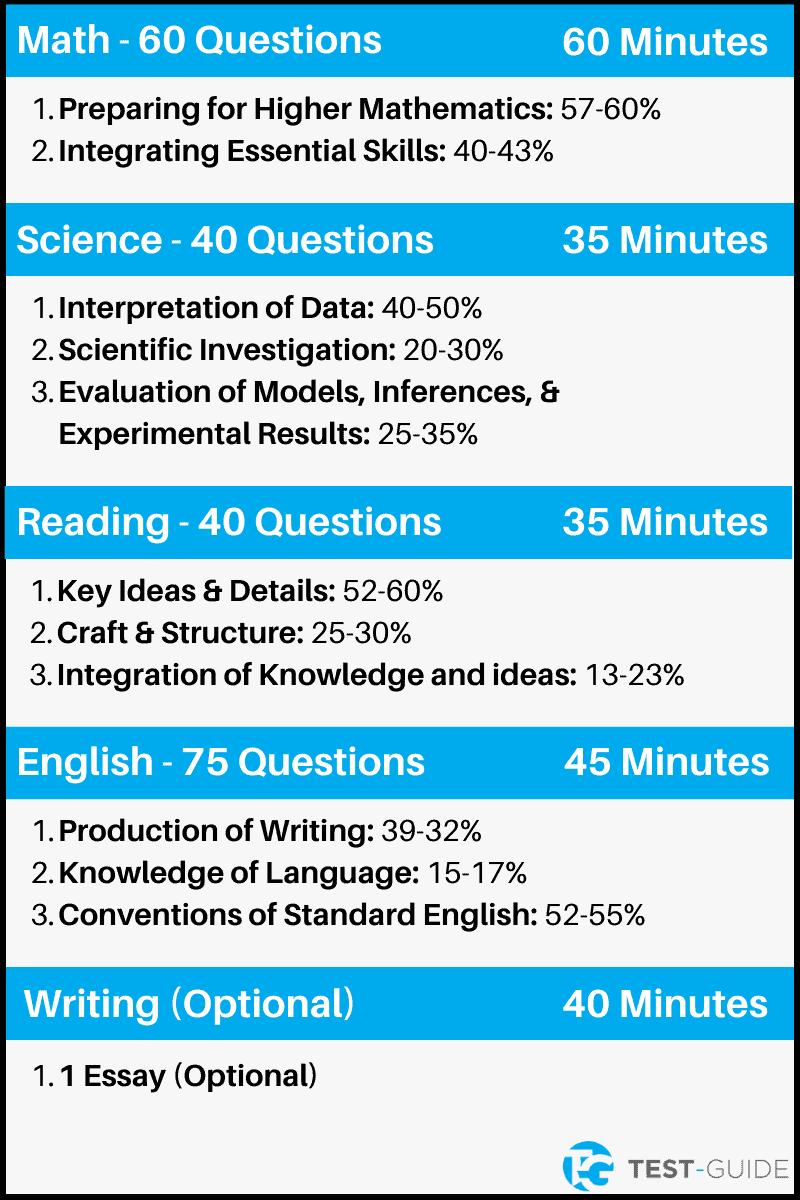All ACT Practice Tests
If you know where you want to focus your ACT practice, choose the subject below. You will find more subject specific ACT practice questions (just like the actual exam).
ACT Math
ACT Science
ACT Reading
- ACT Reading Practice Test 1
- ACT Reading Practice Test 2
- ACT Reading Practice Test 3
- ACT Reading Practice Test 4
- ACT Reading Practice Test 5
- ACT Reading Practice Test 6
ACT English
- ACT English Practice Test 1
- ACT English Practice Test 2
- ACT English Practice Test 3
- ACT English Practice Test 4
Note: The above practice questions were written by Test-Guide.com to help you prepare for the exam and give you the essential ACT practice you need – they are not official ACT questions.
Full-Length ACT Practice Tests
At the links below you will find free full-length ACT practice tests. These tests are from previous years, but are still great study resources.
| Provider | Notes | # Questions | Includes Explanations? |
|---|---|---|---|
| 2020-2021 Official Practice Test from ACT® | Latest official ACT practice test | 215 | No |
| 2020-2021 Official Practice Test from ACT (Spanish) | Latest official ACT practice test in Spanish | 215 | No |
Overview of the ACT
The ACT is an entrance exam used by colleges and universities during the college admissions process.
Fast Facts:
- Length of Exam: 175 Minutes
- Number of Questions: 215 Multiple-Choice Questions
- Number of Sections: 5
- Score Range: 1-36
The five sections on the ACT are math, science, reading, English, and an optional writing section. Each section is given separately and has its own number of questions and time limit.

You can learn more about the exam by reading our ACT overview article.
Scoring of the ACT
You will receive a final total score between 1 and 36, with 36 being a perfect score.
Your total score is calculated by taking your raw score (number of questions answered correctly) for each section and then converting it into a scaled score. The optional writing section is not included in your total composite score.
The average ACT score is around 21. To learn more about scores, read our guide on ACT scores.
Registering for the ACT and Test Dates
To register for the ACT, follow these steps:
- Create An Online Account with the ACT.
- Visit Your Dashboard and Click Register.
- Choose Your Location and ACT Test Date.
- Make Payment for the Exam.
- Add Photo ID and Personal Information.
- Choose Which Colleges to Send Scores To (Optional).
- Confirm Your ACT Registration and Test Date.
The fees for the ACT are:
- Full ACT (No Writing): $68
- Full ACT (With Writing): $93
- Option to Change Test: $25
The ACT is typically given 7 times per year. The exam is given on Saturdays. You can expect the exam to be given in these months:
- Early September
- Late October
- Early December
- Early February
- Mid April
- Early June
- Mid July
You can find exact dates on the official website.
How to Use an ACT Practice Test
We recommend the following when using ACT practice tests to get the most out of your time:
- Take the general ACT practice tests listed above. These will help you get a better understanding of what to expect for all subjects on the exam.
- Discover which subjects you struggled with the most.
- Pick one of those subjects and focus on that subject moving forward. We recommend you take one of the subject specific tests listed above.
- Rinse and repeat.
Many students are unsure of how to practice for the ACT. The above steps are a great way to start your studying journey.
Benefits of Using ACT Practice Tests
Preparing for your ACT with practice tests is a great approach. The benefits of using ACT practice tests includes the following:
Familiarity
The ACT, like most standardized tests, has its own unique format. As you take more and more sample ACT tests, you will begin to see a pattern in the way the questions are written.
When it comes to the actual test, you will know exactly what to expect.
Improving Pace
Each section of the ACT is timed. To do well on the exam, will need to keep a steady pace. Our ACT test practice above will help you learn the pace you need to work at to succeed on the real exam.
Improved Problem Solving
Standardized tests measure your ability to solve problems, not just memorize information. To do well on the ACT (especially the math section) you will need to have strong problem-solving capabilities.
When using a free act practice test, pay special attention to the answer rationales presented in your score report. These will help you discover new (and faster) ways to solve different problem types.
Study More Efficiently
One of the biggest advantages of using an ACT practice test online is that you will be able to narrow down which subject you need to focus your time on.
If you know that you struggle with math, you can spend more time studying math versus a subject that you are more comfortable with.
Frequently Asked Questions
How much time will I have to take the ACT?
You will have 175 minutes to complete the 4 mandatory sections. If you take the optional writing section, you will have 215 minutes.
Are all the sections given at once on the ACT?
Yes, all the sections are given in the same testing window. However, each section is given individually. You will not see questions mixed between categories.
How many total questions are on the ACT?
There will be 215 questions on the ACT. They will consist of multiple-choice questions.
How should I be practicing for the ACT?
We recommend using general ACT practice to begin with. You can use our general ACT questions listed above to get an idea of questions from all 4 subjects on the ACT.
Once you take the general exam, you need to isolate the subject that gave you the most trouble. You should then focus on that specific subject and allocate more time to it.
You can use our free act prep to focus on subject specific needs above.

